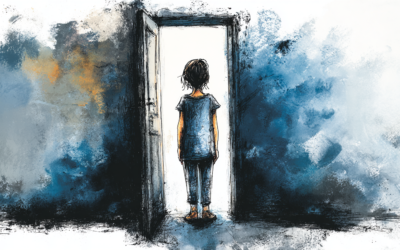Parental estrangement leaves a unique and often invisible scar. Unlike the grief that follows the death of a loved one—a loss society readily acknowledges—the pain of being estranged from a parent is laced with shame, confusion, and isolation. When the parent has chosen distance or rejection, the child is left grappling with questions that feel unanswerable: Why wasn’t I enough? What could I have done differently?
For those who grew up without the opportunity to reconcile, or who find themselves estranged as adults, the emotional fallout can shape their sense of self for years—sometimes decades. This article explores the psychological and emotional impact of estrangement, offering insight into why the pain runs so deep and how it manifests in daily life.
Estrangement as a Form of Disenfranchised Grief
Grief is often associated with loss through death, but the pain of estrangement is no less real. Psychologists refer to the experience of mourning a relationship that still technically exists as disenfranchised grief—a form of grief that goes unrecognized or unsupported by society.
Estranged children may feel the loss of their parent acutely, even if that parent is alive and physically present in the world. However, unlike traditional grief, where there’s often a clear narrative—an illness, an accident, a tragedy—estrangement is ambiguous. There’s no closure, no definitive ending, just the aching absence of a relationship that could have been.
Disenfranchised grief is compounded by the fact that estranged children often feel unable to express their pain. Sharing the story of an estranged parent can invite judgment or misunderstanding, such as:
- “You must have done something to deserve this.”
- “You’re an adult now—why does it matter?”
- “Parents are only human. You should just forgive them.”
These responses can deepen the child’s sense of isolation, making it harder to process their emotions.
The Emotional Wounds of Rejection
At its core, estrangement feels like a rejection of the child’s very being. This rejection cuts deeper than most because it comes from the person who was supposed to provide unconditional love. For adult children, the psychological effects often include:
- Shame and Self-Blame
Many estranged children internalize the belief that they are at fault for the breakdown of the relationship. They replay events from their childhood or past interactions, wondering what they could have done differently to “deserve” their parent’s love. - A Damaged Sense of Self-Worth
Being rejected by a parent can create a persistent sense of unworthiness. The child may struggle with feelings of inadequacy in other areas of life—relationships, career, or personal goals—because the foundational relationship with their parent felt conditional or non-existent. - Complicated Grief
Estrangement creates a unique form of grief, where the mourning process is prolonged by the lingering possibility of reconciliation. Unlike death, where the finality is clear, estrangement keeps the door cracked open just enough to keep hope alive—yet rarely fulfilled. - Fear of Abandonment
Parental estrangement can create a deep fear of abandonment that seeps into other relationships. Romantic partners, friends, or even colleagues may bear the weight of the child’s anxiety about being left or rejected again.
The Long Shadow of Childhood Trauma
For some estranged children, the pain of parental rejection is layered on top of earlier childhood trauma. If the parent was abusive, neglectful, or emotionally unavailable during the child’s formative years, the estrangement feels like an extension of that harm.
Children who endured parental abuse or neglect often face additional challenges in adulthood, such as:
- Attachment issues: Difficulty forming secure bonds with others due to a lack of trust or fear of being hurt.
- Hypervigilance: A constant sense of needing to protect oneself, often stemming from growing up in an unpredictable environment.
- Difficulty with self-compassion: Internalizing a parent’s rejection can lead to a harsh inner critic that mirrors the parent’s voice.
For these individuals, estrangement doesn’t just feel like the loss of a relationship—it feels like a confirmation of long-held fears that they are somehow “unlovable.”
When Estrangement Lingers Into Adulthood
Parental estrangement doesn’t exist in a vacuum. It often shapes how the child moves through the world as an adult, influencing everything from how they parent their own children to how they manage conflict.
Some of the most common long-term effects include:
- Overcompensation in Other Relationships
Estranged children often become hyper-attuned to the needs of others, striving to “earn” the love and validation they were denied. This can manifest as people-pleasing, perfectionism, or difficulty setting boundaries. - Emotional Numbing
To cope with the pain of rejection, some estranged children develop emotional numbing as a defense mechanism. They suppress feelings of sadness or anger, which can lead to a sense of detachment or disconnection from life. - Fear of Becoming Their Parent
For those who have children of their own, the fear of repeating their parent’s mistakes can be overwhelming. They may parent with an almost obsessive determination to be different, while still wrestling with the emotional scars of their own upbringing.
Finding a Path Toward Healing
Healing from the emotional impact of estrangement isn’t about “getting over it” or finding easy answers. It’s about acknowledging the pain, making space for it, and finding ways to move forward. Here are a few strategies that psychologists and therapists recommend:
- Validate Your Feelings
The first step in healing is giving yourself permission to feel what you feel—without judgment. It’s okay to grieve the relationship you never had, to feel angry about the rejection, or to mourn what could have been. - Reframe the Narrative
Estranged children often carry the burden of their parent’s actions as though it’s their fault. Reframing the narrative means recognizing that your parent’s choices were shaped by their own limitations, struggles, and wounds—not your worthiness or value. - Seek Support
Talking to a therapist or joining a support group for estranged children can provide a safe space to share your story. Hearing from others who’ve experienced similar pain can help normalize your feelings and reduce the sense of isolation. - Focus on Self-Compassion
Healing from estrangement involves learning to nurture yourself in the ways your parent couldn’t. Practicing self-compassion—through mindfulness, affirmations, or acts of self-care—can help counteract the inner critic that often accompanies rejection. - Create New Narratives
While the pain of estrangement never fully disappears, it’s possible to create a life filled with connection, purpose, and meaning. Building relationships with people who see and value you for who you are can help rewrite the story of your worth.
A Light in the Dark
The emotional fallout of estrangement is real and lasting, but it doesn’t have to define you. Understanding the impact it has on your life is the first step toward reclaiming your sense of self and creating a future where love and connection are possible—even if they don’t come from the person who gave you life.
In the next article, we’ll explore reconciliation: why it often fails, what gets in the way, and how to navigate the hope and heartbreak of trying to rebuild a fractured relationship.



